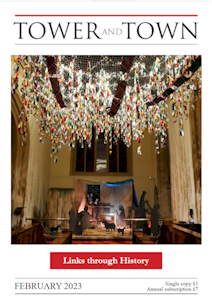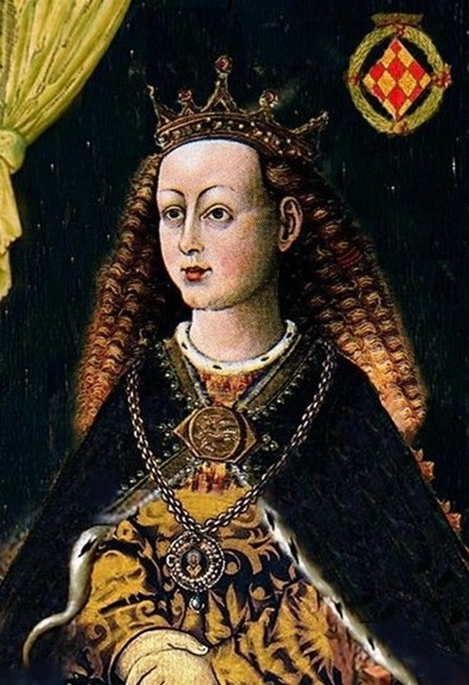

Tower and Town, February 2023 (view the full edition) (view the full edition)A Tale of Two Isabels - Isabel of Gloucester and Isabel of AngoulêmeReaders may recall my article, Isabel of Gloucester - a Remarkable Lady, published in Tower and Town in August. Prince John married Isabel at Marlborough Castle on 29th August 1189, nearly ten years before he became King. The marriage was mired in controversy as the pair were cousins 'in the third degree of consanguinity' sharing, in King Henry I, a common great grandfather. Canonical law prohibited such a marriage unless dispensation was granted by the Pope: it was not. In this article I continue the story to explain how the marriage failed and what happened to Isabel afterwards. Isabel of Angoulême, John's second wife and mother of the future King Henry III, stayed at Marlborough Castle: on one occasion in 1200 for several weeks. So this is a tale of two Isabels.  Isabel of Angoulême Because the Pope had not granted dispensation for the marriage of John to Isabel of Gloucester, Baldwin, the archbishop of Canterbury, forbade John to live with Isabel. John ignored Baldwin appealing to a papal legate that he was seeking dispensation. A request for dispensation was made but never followed up: in the process Baldwin conveniently died. No-one else objected to the marriage. That should have been the end of the matter: but it wasn't. We don't know of any honeymoon. John and Isabel were in Normandy together at some time in 1190 and 1191 as they issued charters there. But no children were born. By 1193, John was estranged from his wife. John's brother Richard was intended to have married Alice, the daughter of the French king Philip, but Richard was more interested in fighting and was fully occupied on the Crusades. John actually considered getting out of his marriage to Isabel to marry Alice instead. King Philip had fallen out with Richard and offered his daughter's hand to John along with those possessions in France that were held by Richard. It was John's mother, Eleanor of Aquitaine, who stopped him, threatening the Crown would seize his estates if he went to France. John stayed and remained married to Isabel: at least for a time. Things came to a head in 1199 when King Richard the Lionheart got in the way of a crossbow bolt during a siege of Chalus castle. On 6th April, ten days later, Richard died of infection caused by the wound. Now king, John did not have Isabel crowned with him at his coronation in May. As papal dispensation for his marriage had never been granted, John didn't need a divorce. Three bishops of Normandy and three of Aquitaine declared the marriage invalid. That was good enough. However, John lost his Gloucester lands as Isabel was now left an unmarried heiress. She maintained a household in Winchester to which John paid £80 a year. He even bestowed occasional gifts to her. But the marriage was over. On 24th August 1200, king John married Isabel of Angoulême at Bordeaux: she was only 12 years old. John brought his child bride across the Channel and had her crowned queen at Westminster Abbey on 8th October. On 25th October John visited Stanley Abbey in north Wiltshire where he was the guest of Abbot Nicholas. He left Isabel at Marlborough Castle while he went on an itinerary of the Midlands and joined his young wife later at hunting lodges south of the Thames. In 1206 John made his ex-wife, Isabel of Gloucester, take into her household and care for his queen, Isabel of Angoulême. On 1st October 1207 a son, Henry, the future king Henry III, was born at Winchester Castle. Following the birth, John's ex was removed to Sherborne and her allowance reduced to £50. In January 1214 Isabel of Gloucester married Geoffrey de Mandeville, Earl of Essex. In 1215 they joined with the rebel barons against King John. Mandeville died on 23rd February 1216 from wounds received at a tournament. King John died on 19th October the same year: his nine-year old son, Henry, succeeded him. Isabel was now Countess of Gloucester and of Essex in her own right. In September 1217 Isabel married her third husband, the baron Hubert de Burgh, one of the regents to the boy-king Henry III. The marriage was brief; Isabel died on 14th October and was buried at Christ Church Canterbury. Isabel of Gloucester's importance within the history of Marlborough centres on her marriage to John, the future king of England, at Marlborough Castle. This was the royal marriage of the time, a day that would have been one of celebration. It was sad the marriage didn't last, if indeed it was ever really a marriage at all. John's second wife, Isabel of Angoulême, came to Marlborough castle too, where she stayed for several weeks waiting for her husband to return from his Midland itineraries. Nick Baxter |